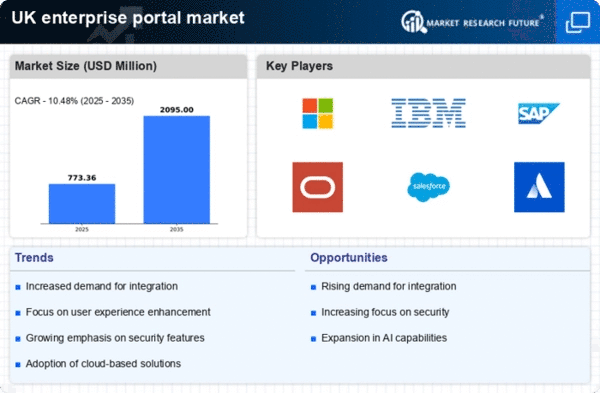Advancements in Cloud Technology
is being propelled by advancements in cloud technology., which are transforming how organisations manage their digital infrastructure in the UK. The shift towards cloud-based solutions offers businesses enhanced flexibility, scalability, and cost-effectiveness. As organisations increasingly migrate to the cloud, the demand for enterprise portals that can seamlessly integrate with cloud services is on the rise. Current trends indicate that over 50% of UK enterprises are adopting cloud technologies, which is likely to drive the enterprise portal market forward. This trend suggests a potential growth rate of 14% in the coming years as companies seek to leverage cloud capabilities to enhance their operational efficiency and collaboration.
Growing Importance of Data Analytics
is increasingly shaped by the growing importance of data analytics. in decision-making processes within UK organisations. Companies are recognising the value of leveraging data to gain insights into customer behaviour and operational performance. As a result, enterprise portals are being equipped with advanced analytics tools that allow users to visualise and interpret data effectively. Recent statistics indicate that 65% of UK businesses are investing in data analytics capabilities, which in turn drives the demand for enterprise portals that can integrate these functionalities. This trend suggests that the enterprise portal market may experience a compound annual growth rate (CAGR) of 10% as organisations seek to harness the power of data for strategic advantage.
Increased Focus on Remote Work Solutions
is significantly influenced by the growing emphasis on remote work solutions in the UK.. As organisations adapt to flexible working arrangements, the need for robust enterprise portals that support remote collaboration has become paramount. Data suggests that around 60% of UK employees now work remotely at least part-time, necessitating tools that enable effective communication and project management. Enterprise portals serve as centralised platforms where teams can access resources, share information, and collaborate in real-time, regardless of their physical location. This trend is expected to drive the enterprise portal market forward, with an anticipated growth rate of 12% over the next few years as companies invest in technologies that enhance remote work capabilities.
Rising Demand for Digital Transformation
The enterprise portal market is experiencing a notable surge in demand driven by the ongoing digital transformation initiatives across various sectors in the UK. Businesses are increasingly recognising the necessity of integrating digital solutions to enhance operational efficiency and improve customer engagement. According to recent data, approximately 70% of UK organisations have prioritised digital transformation as a key strategy for growth. This shift is compelling companies to adopt enterprise portals that facilitate seamless communication and collaboration among employees, thereby streamlining workflows. As organisations strive to remain competitive, is likely to witness substantial growth., with projections indicating a potential increase in market size by 15% annually over the next five years.
Emphasis on Compliance and Regulatory Standards
is significantly impacted by the emphasis on compliance and regulatory standards in the UK.. With increasing scrutiny from regulatory bodies, organisations are compelled to adopt solutions that ensure adherence to legal requirements and industry standards. Enterprise portals are being designed to incorporate compliance features that facilitate the management of sensitive information and streamline reporting processes. Approximately 75% of UK companies are prioritising compliance in their digital strategies, which is likely to drive the adoption of enterprise portals that offer robust security and compliance functionalities. This focus on regulatory adherence is expected to contribute to a steady growth trajectory for the enterprise portal market, with estimates suggesting a growth rate of 8% annually.
















